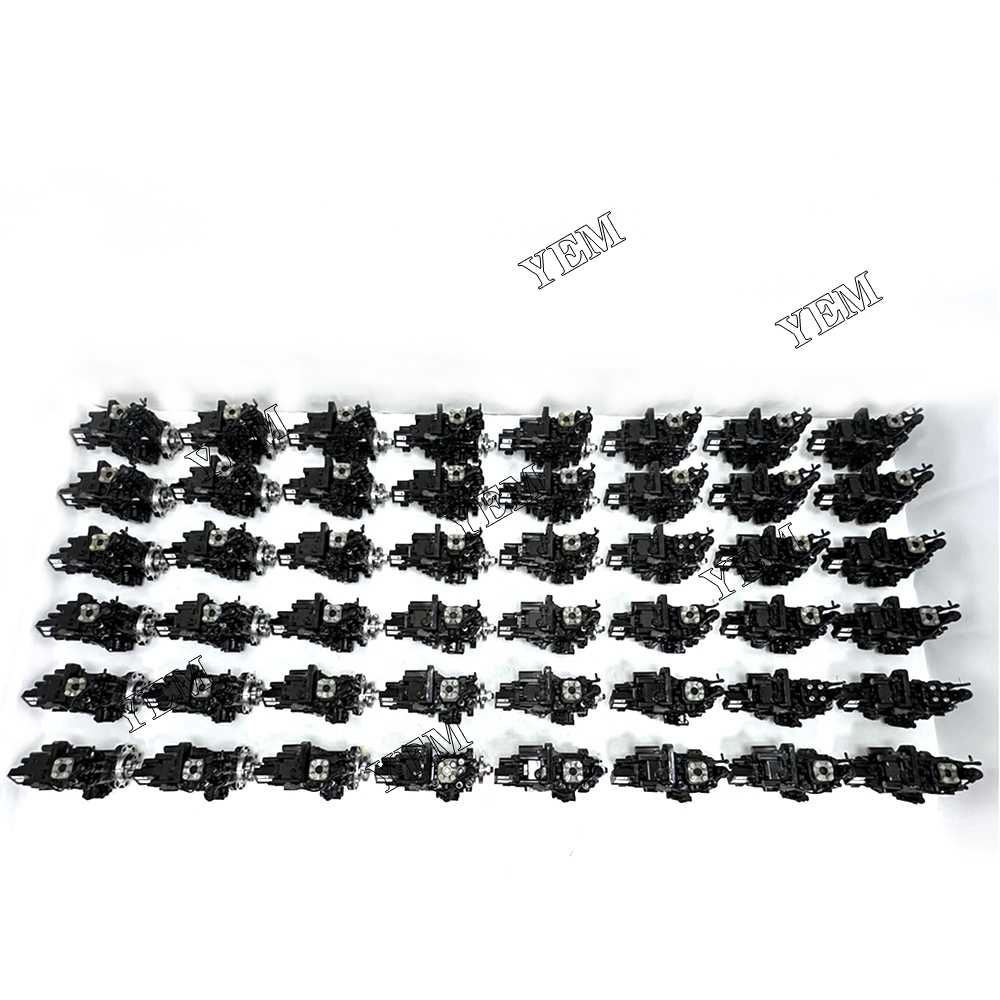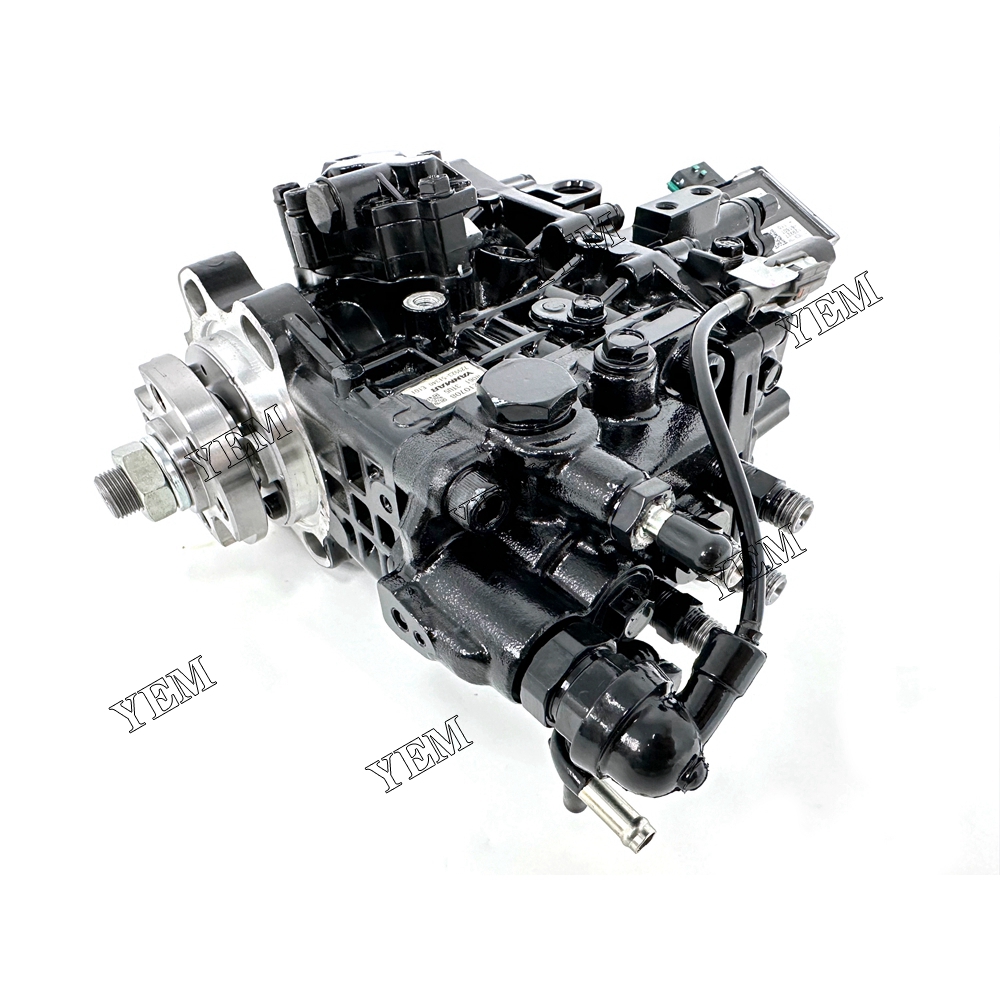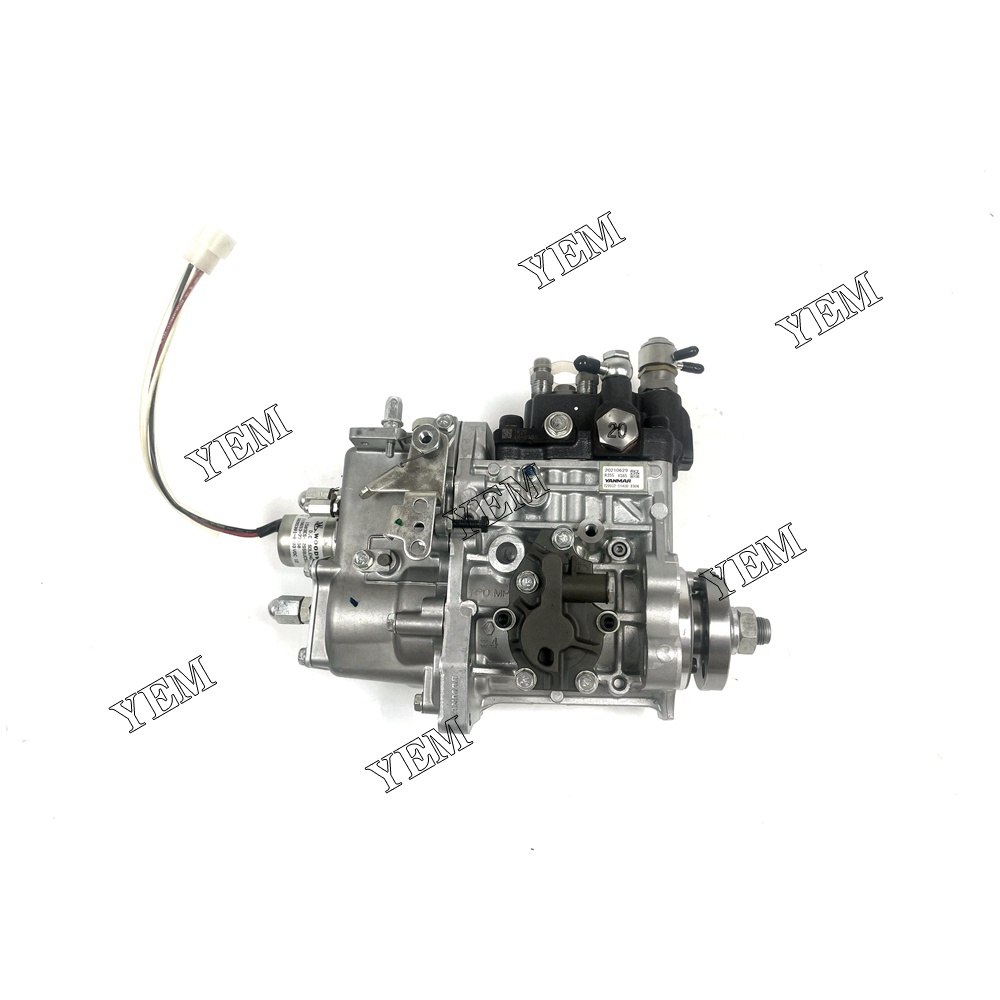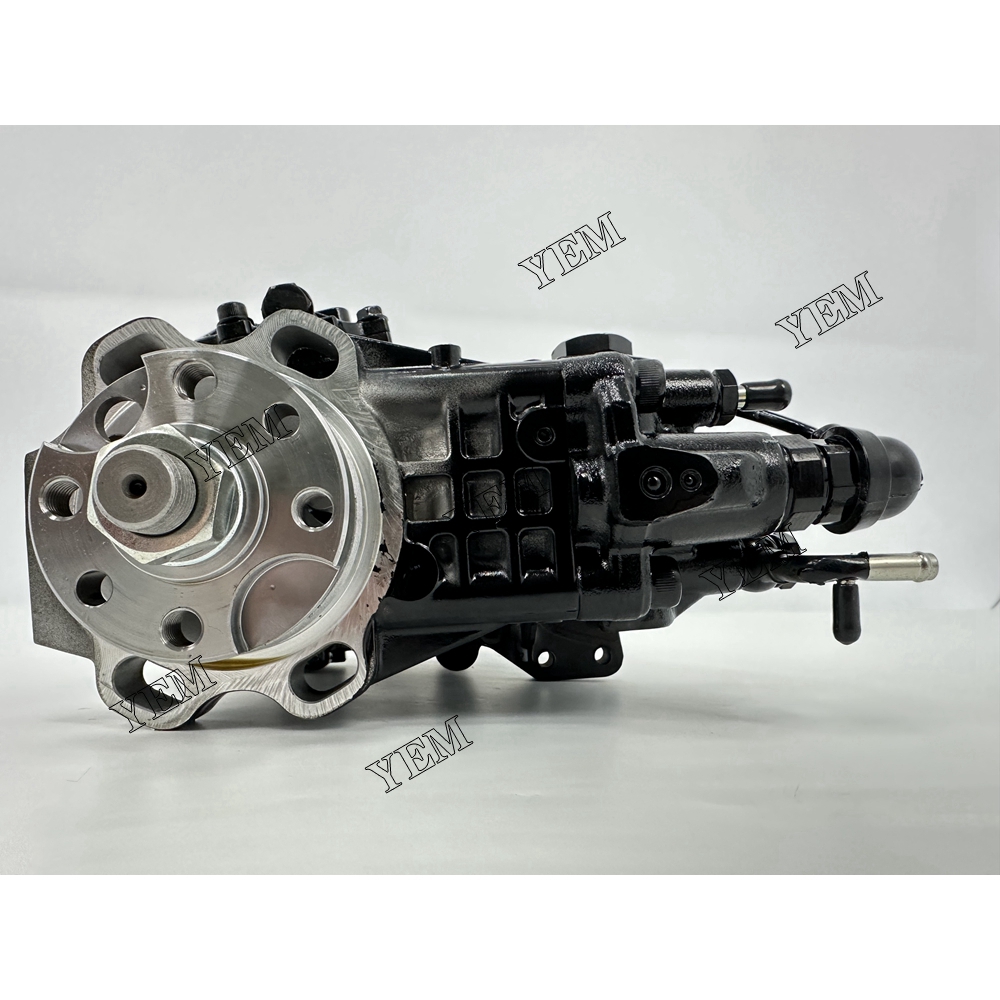The working principle of the 4TNV98 diesel pump is one of the keys to the operation of the diesel engine. The following is a brief description of the working principle of the 4TNV98 diesel pump:
- Fuel supply: The main function of the diesel pump is to pump fuel from the fuel tank, and then supply it to the combustion chamber of the engine after a series of treatments. The supply of fuel needs to maintain a certain pressure and flow to ensure the normal operation of the engine.
- High Pressure Injection: The diesel pump will compress the fuel to a very high pressure before supplying it to the combustion chamber. When the compressed gas in the cylinder reaches the highest pressure, the fuel injector will inject high-pressure fuel into the cylinder, mix and burn with high-temperature and high-pressure air, and drive the piston to complete the working cycle.
- Adjustment control: The diesel pump is usually controlled by a speed regulator, which can adjust the fuel supply according to the engine load. This can effectively control the engine speed and output power.
- Precise Injection: The diesel pump must ensure that the injection amount and injection time of the fuel are very precise to ensure complete combustion of the fuel and maximize the efficiency and power output of the engine.
- Sealing performance: The diesel pump needs to have good sealing performance to ensure that fuel does not leak and to prevent external impurities from entering the system and affecting the normal operation of the engine.
In general, the 4TNV98 diesel pump effectively supplies fuel to the engine through steps such as fuel compression, injection, control and precise adjustment, and ensures efficient and stable combustion, thereby driving the engine to run smoothly. The coordination of these working principles ensures the normal operation and efficient performance of the engine.

The 4TNV98 diesel pump is a diesel engine produced by Yanmar. The following are some possible performance parameters that usually affect the working efficiency and performance of the diesel pump:
- Maximum fuel supply: This refers to the maximum amount of fuel that the diesel pump can supply to the engine per unit time, usually in liters per hour (L/h) or liters per minute (L/min) To represent.
- Rated working pressure: The rated working pressure that the diesel pump can achieve, usually in bar (bar) or kilopascal (kPa). The higher the working pressure, the greater the fuel injection pressure and energy, which helps to increase the engine’s power output.
- Fuel injection angle: This refers to the angle at which the fuel injector injects fuel into the engine combustion chamber. The design of the injection angle will affect the fuel injection effect and combustion efficiency.
- Fuel distribution accuracy: This refers to the uniformity and accuracy of the diesel pump in supplying fuel to each cylinder. The even distribution of fuel has an important impact on the performance and emissions of the engine.
- Fuel injection pressure: The higher the working pressure of the fuel injection system of the diesel pump, the finer the injected fuel particles will be and the combustion will be more complete, which will help to improve fuel utilization and engine efficiency.
- Speed regulating range: The maximum speed regulating range that the diesel pump can achieve, that is, the range of speed changes that can be achieved under different load conditions.
The above are some of the things that might be covered in an article about 4TNV98 diesel pump performance parameters. These parameters are of great significance for evaluating the performance of the diesel pump and its scope of application. I hope this content can help you better understand the performance characteristics of diesel pumps.
For the 4TNV98 diesel pump and the matching diesel engine, regular maintenance is the key to ensuring its long-term stable operation and extending its service life. Here are some maintenance tips:
- Regular replacement of engine oil and oil filter: Regular replacement of engine oil can maintain the lubrication performance inside the engine and reduce wear. At the same time, the oil filter should also be replaced regularly to maintain the cleanliness of the engine oil.
- Clean the air filter: The air filter is crucial to the normal operation of the engine. Regular cleaning or replacement of the air filter can prevent impurities from entering the engine and ensure the cleanness of the air supply.
- Check and maintain the coolant system: Regularly check the cooling performance of the coolant, maintain appropriate fluid levels and cleanliness of the cooling system to ensure that the engine is operating within the normal temperature range.
- Regular inspection and adjustment of the fuel injection system: Regularly check the working status of the fuel injection system, including the pressure and working conditions of the fuel injection nozzle and fuel injection pump, to ensure the accuracy and efficiency of fuel injection.
- Check and maintain the electrical system: including batteries, generators, starting systems, etc., to ensure the normal operation of the electrical system and avoid failures caused by circuit failures.
- Regular inspection of the transmission system: including transmission belts, lubrication systems, cooling fans, etc., to ensure the normal operation of the transmission system and reduce the occurrence of failures.
- Regular inspection and replacement of filters: including fuel filters, air filters, etc., to ensure the cleanliness of fuel and air and to maintain the normal operation of the engine.

The above are some common maintenance measures. Through regular maintenance, the service life of the diesel engine can be extended and the normal operation and stable performance of the engine can be ensured. It is recommended to arrange a reasonable maintenance plan based on specific usage conditions and manufacturer recommendations. If you need more detailed maintenance information or have other questions, please feel free to ask me.
When the 4TNV98 diesel pump or matching diesel engine fails, timely investigation and processing are very important. The following are general troubleshooting steps for reference:
- Observe and record fault phenomena: First, it is necessary to accurately describe the fault phenomenon, including the frequency, conditions, sounds, vibrations, etc., in order to better locate the problem.
- Check fluid level and pressure: Check the fluid levels of engine lubricating oil, coolant and fuel to ensure they are within the normal range. Also check whether the pressure of the hydraulic system is normal.
- Check the electrical system: Check the battery status, circuit connections, fuses and switches to ensure that the electrical system is working properly. This may be one of the reasons why the engine cannot start.
- Check the transmission system: Check the transmission belt, transmission shaft, lubrication system, etc. for abnormal wear or looseness, and make timely adjustments and replacements.
- Check the cooling system: Check whether the coolant circulation is smooth, whether the water pump is operating normally, and whether the heat dissipation device is blocked to ensure normal cooling of the engine.
- Check the fuel system: Check whether the fuel filter, fuel injector, fuel injection pump, etc. are blocked or damaged to ensure normal fuel supply.
- Check the exhaust system: Check the exhaust pipe for air leakage, obstruction, etc., and eliminate performance problems that may be caused by exhaust failure.
- Use fault diagnosis tools: Use the fault diagnosis tools equipped with the machine, such as fault code readers, to diagnose the engine and locate faults faster.

The above are general troubleshooting steps, but your specific situation may vary. When troubleshooting, you can handle it step by step according to the specific fault phenomenon and situation. If you encounter problems, it is recommended to seek help from professional technicians. I hope this information is helpful and if you have any further questions please feel free to ask.
4TNV98 diesel pumps and matching diesel engines are widely used in various application fields, including but not limited to the following major fields:
- Agricultural field: Diesel engines are widely used in the agricultural field and are used to drive agricultural machinery and equipment, such as tractors, harvesters, sprinklers, etc., to improve agricultural production efficiency.
- Construction engineering field: Diesel engines are often used in excavators, cranes, concrete mixer trucks and other engineering machinery and equipment on construction sites for construction operations.
- Industrial field: Diesel engines are widely used in industrial equipment, such as generator sets, pump machinery, compressors, etc., to provide power support and energy supply.
- Shipping field: Diesel engines are widely used on ships as main engines or auxiliary engines to provide power to propel ships sailing.
- Railway transportation field: Diesel engines are also used in railway transportation to drive trains, locomotives and other railway vehicles.
- Military field: Diesel engines have important applications in the military field and are used in the power systems of military vehicles, armored vehicles, tanks, etc.
- Other fields: Diesel engines can also be used in various special occasions, such as oil field equipment, mining equipment, marine engineering and other fields.
In general, 4TNV98 diesel pumps and diesel engines are widely used in equipment and machinery that require high power, high efficiency and reliability. Different application fields have different requirements for engine performance, durability and energy saving, so specific needs and situations need to be fully considered during selection and use. Hopefully this information will help you understand its application areas, and if you have any other questions, please feel free to ask.
For fault diagnosis of the 4TNV98 diesel pump or matching diesel engine, the following are general steps and methods for reference:
- Observe Phenomenon: First, it is necessary to accurately describe the fault phenomenon, including difficulty in starting the engine, power drop, abnormal noise, smoke, etc.
- Check basic components: including fuel system, electrical system, cooling system, transmission system and other basic components, check for leaks, damage, looseness, etc.
- Use diagnostic tools: Use diagnostic tools such as a fault code reader to connect to the engine control unit to read the fault code to help locate the problem.
- Check the electrical system: including battery, generator, starter, etc. Check whether the circuit connection is normal and the voltage is stable to ensure the normal operation of the electrical system.
- Check the fuel system: Check the fuel filter, fuel pump, fuel injector and other components to eliminate problems caused by insufficient fuel supply or poor fuel quality.
- Check the cooling system: Check whether the coolant is sufficient, whether the water pump is operating normally, and eliminate faults caused by overheating.
- Check the transmission system: Check the transmission belt, lubrication system, hydraulic system, etc. to ensure that the transmission system is working properly and avoid failures caused by transmission problems.
- Check the exhaust system: Check whether the exhaust pipe is smooth, whether the muffler is leaking, and eliminate abnormalities caused by exhaust system problems.
- Step-by-step elimination: Based on the results of observation and inspection, possible problems are gradually eliminated until the root cause of the failure is found.

During the fault diagnosis process, careful observation and patient inspection are required, and professional tools and technical knowledge are combined to solve the problem in a targeted manner. If you encounter difficulties or unresolvable faults, it is recommended to seek help from professional technicians. I hope the above information is helpful to you. If you have any other questions, please feel free to ask.
As a leader in the industry, YEM adheres to the tenet of “quality first, customer first” and continues to innovate and progress. We not only provide high-quality products, but also provide thoughtful after-sales service and technical support, so that you have no worries during use.
Choose YEM and choose professional, reliable and efficient excavator accessories solutions. Let us work together to create new glory in the field of excavators!
If you have any excavator accessories needs or cooperation intentions, please feel free to contact us. YEM is dedicated to providing you with the best service and support!
YEM, your good excavator partner!
Thank you for your attention and support!
Sincerely, YEM Team
